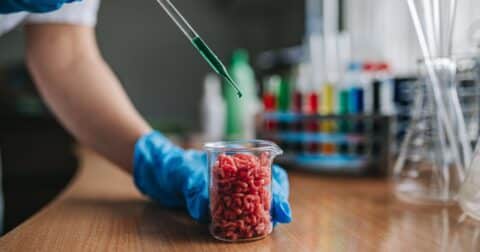Fact Check
Fact-Checking Claims Made About Oklahoma’s Lawsuit Against Tyson Foods
Food•5 min read
Explainer
The political backlash to lab-grown meat in the U.S., explained.


Words by Seth Millstein
For years, scientists have been working on technology that can grow bona fide, food-grade meat in a laboratory without killing any animals. Although the technology is still years away from commercial viability, lab-grown meat companies have raised billions of dollars in investments, and the USDA preemptively approved the sale of lab-grown meat last year. But even though it hasn’t hit shelves yet, there’s been a growing backlash to lab-grown meat.
Over the course of one week in May, two states — Florida and Alabama — made it a crime to sell lab-grown meat; two other states are considering legislation that would do the same, and even a U.S. Senator has signed on to the idea.
So, what’s the beef with lab-grown meat, and why are lawmakers trying to ban it?
Lab-grown meat is made when scientists extract a single stem cell from an animal — a pig, for instance. That cell is then combined with a nutrient broth and placed in a bioreactor, which causes the cell to multiply and grow into muscle tissue. That tissue is either shaped into a burger or a nugget or, using what scientists call “scaffolding” can be grown into a steak.
There are a number of reasons why lab-grown meat is an attractive proposition.
The ability to produce, sell and eat meat without killing any animals would clearly benefit farm animals; over 100 billion animals are killed in factory farms every year, and lab-grown meat represents an opportunity to significantly reduce that death toll.
Lab-grown meat also has the potential to be much more environmentally-friendly than traditional meat, though the existing body of research relies on some speculation as cultivated meat isn’t widely available for sale. We do know animal agriculture is responsible for somewhere between 11 and 19 percent of all greenhouse gasses, and is the biggest driver of deforestation on the planet. The industrialized production of meat erodes topsoil, pollutes waterways, destroys ecosystems, and in general, wreaks havoc on the planet.
The environmental impact of lab-grown meat is still being researched, however, but some research does suggest production would be far easier on the environment than traditional meat. One study commissioned by the Good Food Institute (a group that advocates for wider adoption of alternative proteins) found that if lab-grown meat facilities used renewable energy, their carbon footprints would be 92 percent lower for beef, 52 percent lower for pork and 17 percent lower for chicken, though the study is “speculative,” in that it assumes more plentiful clean energy and a larger production facility. A subsequent cultivated meat study that found quite the opposite was not peer-reviewed yet received significant media attention.
No, and it’s still a ways away from reaching a grocery store or restaurant near you. Scaling the lab-grown meat technology to the level needed for widespread production will require billions, if not trillions, in additional investments, to be even close to competitive with traditional meat.
Even though the cost of producing lab-grown meat has fallen steeply since its public debut in 2013, attracting an extra few billion dollars in investments is no easy task amid a more cooled-off investment atmosphere for alternative proteins. Still, it’s not inconceivable that lab-grown meat could at least be commercially available at more than one or two high-end restaurants within a few years — and apparently, lawmakers in the South have noticed.
So far, two states have passed and enacted laws banning the sale of lab-grown meat: Florida and Alabama. The Florida law makes it “unlawful for any person to manufacture for sale, sell, hold or offer for sale, or distribute cultivated meat” in the state, with violators facing up to 60 days in jail. In Alabama, the penalty is up to 90 days in jail and a $500 fine.
Tennessee lawmakers were also considering a bill that would ban lab-grown meat (though this was ultimately shelved), and the Arizona House of Representatives has already passed such a ban — but it died in the state Senate, and will not become law (for now).
There hasn’t been any attempt to ban lab-grown meat on the federal level. However, Democratic Sen. John Fetterman made headlines in May when he announced his support for the Florida law, writing on social media that he “would never serve that slop to my kids.”
“Florida is fighting back against the global elite’s plan to force the world to eat meat grown in a petri dish or bugs to achieve their authoritarian goals,” Florida Gov. Ron DeSantis boasted in a press release announcing his state’s ban.
There’s little truth to be found in this statement. Lab-grown meat is being promoted by animal welfare groups, private corporations, climate scientists and environmentalists, not just “global elites.” It doesn’t contain bugs, nobody is attempting to force anyone else to eat it and there is no evidence of a link to authoritarianism.
Other proponents of a lab-grown meat ban have made similarly odd comments explaining their positions. Tennessee State Rep. Susan Lynn, who’s spearheading her state’s push to ban lab-grown meat, said that it’s a matter of “ethics,” and suggested that lab-grown meat is “semi-cloning” (it isn’t), while Florida State Rep. Tyler Sirois told Politico that lab-grown meat is an “affront to nature and creation.”
Meanwhile, there’s nothing natural or ethical about the conditions animals live in under industrial agriculture systems.
Some proponents of a lab-grown meat ban have cited safety concerns, and floated the possibility that lab-grown meat is, in the words of Florida Agriculture Commissioner Wilton Simpson, “potentially unsafe” for human consumption. The FDA, for its part, has determined that lab-grown meat is safe to eat. Lab-grown meat also won’t be exposed to antibiotics or the same pathogens as meat that comes from farms.
The push to ban lab-grown meat is a mix of politics, culture wars and economics. Traditional meat is a hundred-billion dollar industry in the U.S., and while some leading meat brands are actually investing in cultivated meat, many people who work in the industry believe, rightly or wrongly, that lab-grown meat is a threat to their livelihoods. It’s no coincidence then that Florida, the first state to enact such a ban, is the ninth highest beef-producing state in the country, with a vocal community of cattle ranchers.
To his credit, DeSantis made his motivations clear at a press conference announcing the ban. He said that supporters of lab-grown meat believe that “raising cattle [is] destroying our climate,” and accused them of wanting to “eliminate meat production in the United States.”
“Before we were even a state, [animal agriculture] was going on in Florida,” DeSantis said, flanked by members of his state’s cattle industry. “We stand with agriculture, we stand with the cattle ranchers, we stand with our farmers, because we understand that it’s the backbone of our state.”
Rep. Danny Crawford, one of the sponsors of the Alabama law, echoed this sentiment, saying that lab-grown meat “does compete with our farming industry.” The defeated Arizona bill stated that cattle is “one of the five foundational pillars that have driven Arizona’s economy since territorial days.”
Finally, it’s been suggested that the push to ban lab-grown meat, which is largely being pushed by conservative Republicans, has a culture war element to it as well.
If lab-grown meat were to overtake traditional meat, writes libertarian economist Tyler Cowen, then “both humankind’s dominion over nature, which runs strong in the Christian strand of conservative thought, and the masculinized meat-eating culture — more specifically, the meat-grilling culture — would be under threat.”
So, are Florida’s and Alabama’s bans on lab-grown meat anomalous one-off events, or are they indicators of what’s to come in other states? It’s too soon to say for sure, but we do know legislative efforts to stall alternative proteins are nothing new — and that suggests this trend may indeed continue, along with its consequences for consumers, animals and climate action.